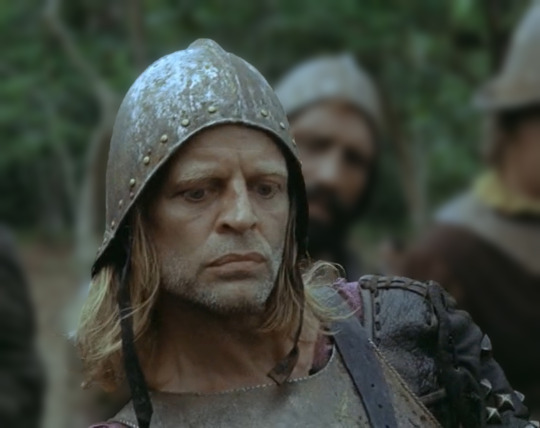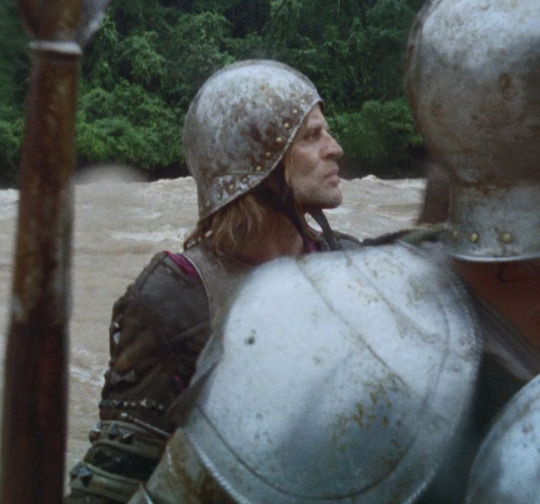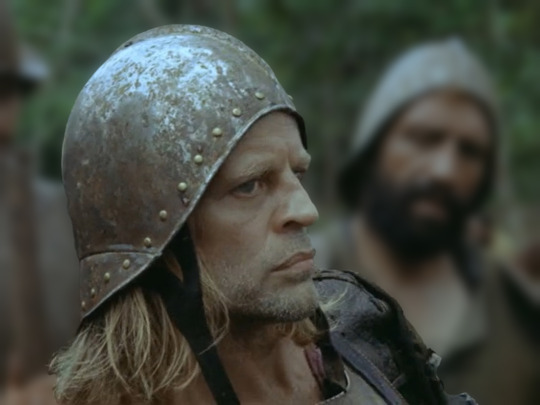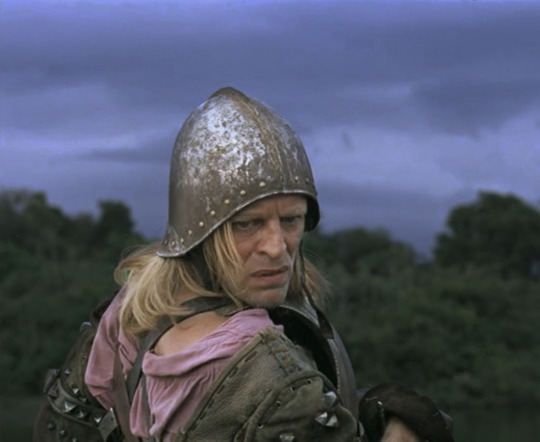#aguirre the wrath of god
Text


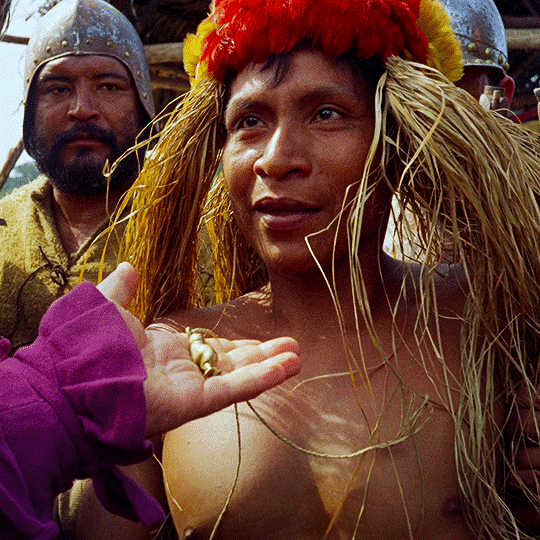

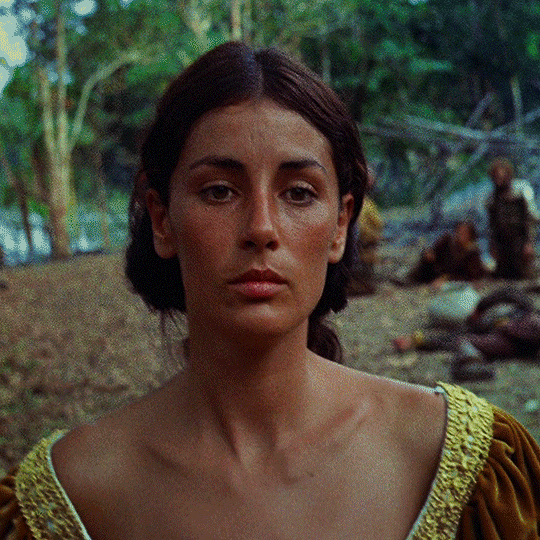




If I, Aguirre, want the birds to drop dead from the trees… then the birds will drop dead from the trees. I am the wrath of God. The earth I pass will see me and tremble. But whoever follows me and the river, will win untold riches.
Aguirre, the Wrath of God (1972) dir. Werner Herzog
#aguirre the wrath of god#1970s#filmedit#creations#mikael#werner herzog#userteri#userjosh#userk8#userdiana#userlee#userkd#usertreena#useranimusvox
285 notes
·
View notes
Text


Aguirre, the Wrath of God (1972)
84 notes
·
View notes
Text
#I'd like this scene to be a meme template#like put “me on twitter” and “me on tumblr” labels#you get the idea#werner herzog#aguirre the wrath of god#klaus kinski
529 notes
·
View notes
Text
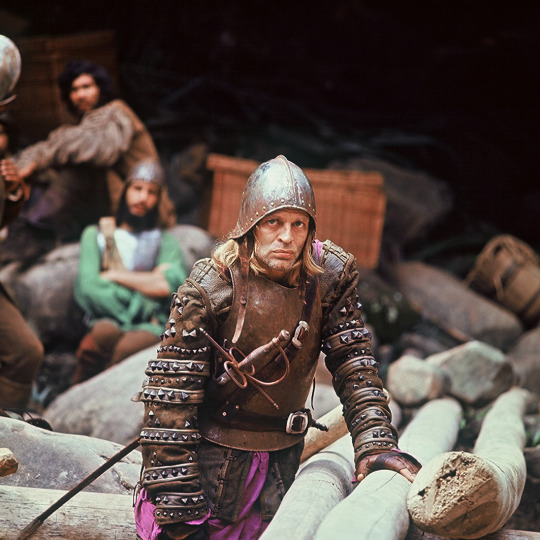
Aguirre, the Wrath of God (1972)
Original title: Aguirre, der Zorn Gottes
(a film by) Werner Herzog

43 notes
·
View notes
Text
I don't think attention spans are worse these days than before. People have always thought slow, thought provoking movies like Stalker or Aguirre: The Wrath of God were intolerably slow and boring. Movies have always had a bunch of cuts between different camera angles and fast moving plots to keep people interested. A generation of people that won't watch a TikTok longer than 2 minutes isn't dealing with poor attention spans, they're dealing with content that's generally pretty bad. Like, have you seen most Youtube videos that are more than 5 minutes long? They're terrible. Long form content creators like HBomberGuy and Folding Ideas still get millions of views on their 2 hour long video essays because they're good at pacing and editing. Some teenager messing around on their phone is not. Kids these days don't have worse attention spans, they're just really bad at making movies. And the only reason that part is even true is because they have the opportunity to record movies; every teenager has a film camera in their pocket with a dizzying array of effects and a distribution network to go with it, so of course we're going to get a lot more amateur productions.
Basically kids are just having fun making videos that aren't quite well made and other kids are watching them but dipping out at a reasonable time. It's fine, it's normal, and when they grow up they can try to watch Solaris.
#movie#cinema#film#solaris#stalker#andrei tarkovsky#hbomberguy#folding ideas#aguirre the wrath of god#werner herzog#tiktok
43 notes
·
View notes
Text

watched 62 films for the first time in 2023 & these are my top 16
#mine#film#aguirre the wrath of god#all the president's men#apocalypse now#withnail and i#videodrome#la notte#who’s afraid of virginia woolf#mean streets#the seventh seal#my dinner with andre#stalker#ran#the gleaners and I#crash#secretary#poor things
18 notes
·
View notes
Text
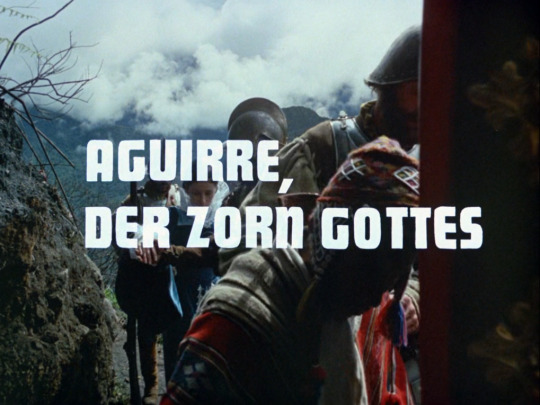
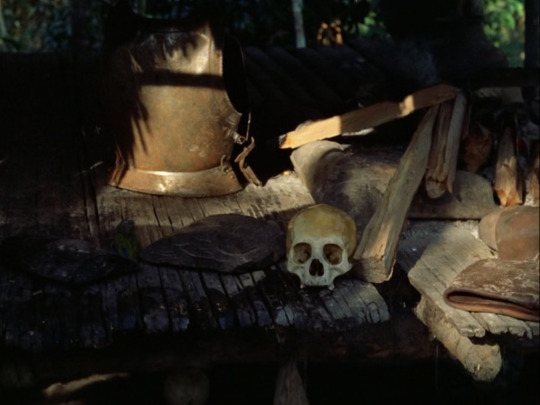
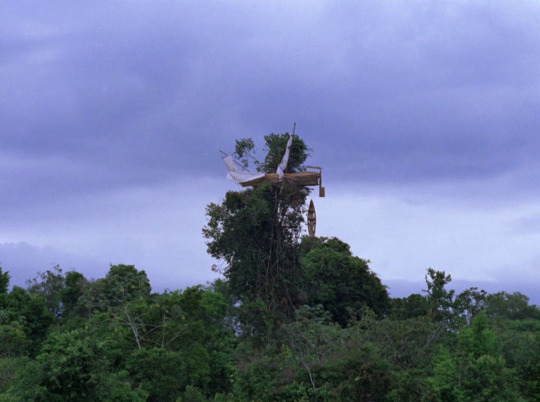

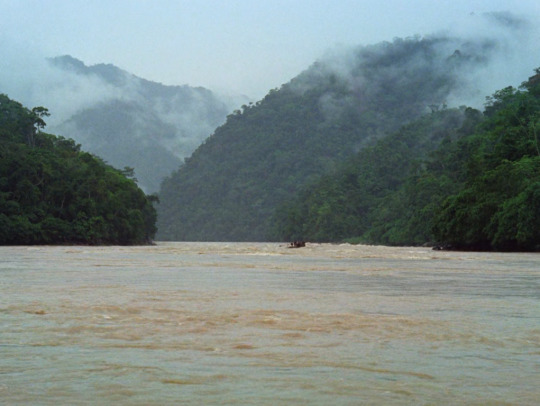
Aguirre, the Wrath of God(1972), Werner Herzog.
الكولوناليزم كما أفهمها وأحب أن أراها والله
13 notes
·
View notes
Text
Film #489: 'Aguirre, the Wrath of God', dir. Werner Herzog, 1972.
"My men measure riches in gold [...] I despise them for it."
One of the difficulties in evaluating any film directed by Werner Herzog is figuring out exactly how much of what Herzog says can be believed. The director is known as much for his fanciful exaggerations of the difficulties of filming as he is for his collaborations with the actor Klaus Kinski. In Aguirre, the Wrath of God, the first of these collaborations, Kinski plays the title character, a conquistador who usurps control over a party of Spanish explorers, driving them deeper into the Peruvian jungles in search of the lost city of gold. Aguirre's steadily-disintegrating sanity leads to exactly the kind of results you might expect for a group unprepared for the harshness of the conditions. If Herzog's descriptions of the film's production are to be believed, though, it's perhaps one of the more astonishing examples of 'Method production' the world has ever seen.
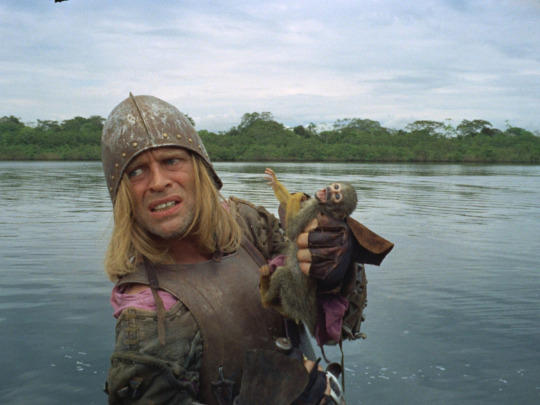
In late 1560, Pizarro's army of conquistadors are in search of the fabled city of El Dorado (in reality, Pizarro had died more than a decade before, but Herzog is playing around with truth and fiction throughout the film - Don Lope de Aguirre, like Pizarro, is a real historical figure). Running low on supplies, Pizarro elects to send a scouting team ahead, across swollen rivers and treacherous jungle. The scouting team is led by Don Ursúa, with Aguirre as his second-in-command, as well as Don Fernando de Guzmán and Brother Carvajal as the representatives of the Spanish crown and God, respectively. The group is immediately faced with difficulties: their rafts encounter rapids or are swept away overnight. Faced with the prospect of wasting time trying to rescue some of their party members from a trapped raft, they are instead killed; Aguirre renders the discussions about retrieving and burying the bodies by having the raft 'accidentally' destroyed by cannon fire.
Pizarro has ordered the scouting party to return after a week, but Aguirre mounts a rebellion and Don Ursúa is injured. Aguirre continues to manipulate the survivors, forcing Don Fernando de Guzmán into the role of the party's leader and pressuring him to sign a declaration of independence. The group continues further into the jungle, holding a show trial for Ursúa. Guzmán exercises his powers to grant clemency, but alienates the others by consuming most of the party's dwindling food. As their numbers grow lower and lower, the party begins to turn on each other more - Carvajal's zealotry results in him having two indigenous Peruvians murdered for blasphemy (when in fact they simply do not understand the concept of books), and before long Guzmán has been murdered. Aguirre takes control of the group and has Ursúa executed. Starvation and illness take root, and the survivors begin to hallucinate, imagining a large ship stuck in the branches of a tree, and failing to recognise when they are being shot at with arrows. Before long, Aguirre is the only survivor. As his raft is swarmed by small monkeys, he imagines starting a new dynasty in Peru with his (now dead) daughter. The film ends with a long tracking shot around the ruins of the raft, Aguirre cutting a lonely and delusional figure.
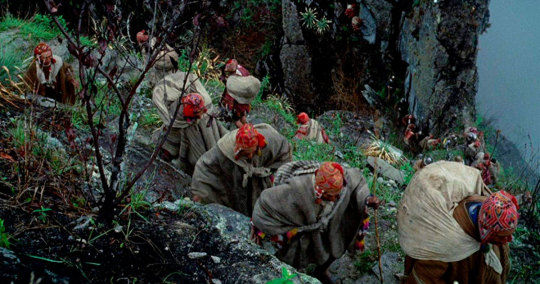
Themes of madness and obsession are common throughout Herzog's films, especially his collaborations with Kinski. Herzog has also prided himself on making his films on location and writing events from filming into his scripts. The destruction of the rafts in Aguirre, for example, is purportedly the result of the rafts being washed away during filming, necessitating a delay which Herzog immediately incorporated into the film. This commitment to experiencing in reality the fictional events of his film is similar to Herzog's approach to Fitzcarraldo (1982), another film in which Kinski starred, which tells the story of an opera buff who had his ship moved across a mountain range in South America. Despite the fact that Fitzgerald had the ship dismantled before moving it, Herzog conceptualised the film as a man having an intact steamboat pulled up a mountainside, and then set about 'replicating' this imagined scenario. Herzog seems drawn to - sometimes literally - larger-than-life stories about ambition, and these are often drawn from very brief pieces of inspiration. Aguirre, according to the film's audio commentary, was inspired by half a page of text in a book Herzog had borrowed, from which he constructed his entire initial screenplay. It also seems apparent from what Herzog has said about the experience of filmmaking that he views his craft in much the same way. He is a director driven, to an almost amoral degree, to make films. It is commonly agreed that the film with which Aguirre was made was stolen, a subject about which Herzog has said that he had a right to do so. Herzog has also said that Kinski's temper was so bad that, in a rage, he fired multiple gunshots at a hut where the production team were playing cards, resulting in an extra getting injured. If this is true, it suggests a level of neglect within the production bordering on outright criminality. Herzog thus comes across as a director who either has no compunctions about embellishing the real circumstances of his films as much as the fictional narratives within them, or who views these circumstances as a necessary peril. It says a lot about who Werner Herzog is that I genuinely cannot tell which is more likely. His apparent belief that someone as volatile as Klaus Kinski was the only person who could play Aguirre suggests, at the very least, a profound lack of understanding about how acting works.
For all that, there are moments in Aguirre, the Wrath of God that are nearly transcendental. I don't mean to suggest that there were no ways of achieving these results without putting everyone at risk, but I can see how Herzog might have seen the finished film and considered it a vindication of his production process. The difficulties of filming on a low budget and on location, in an environment spectacularly ill-suited for this, have created a very specific type of intimacy in the early scenes. The camera lens is frequently splattered with mud and water, implying to the viewer that there was no luxury of a retake for any of these scenes, and no ability to keep the camera and crew distant and safe from the action. As the film progresses, however, the camera seems to grow more distant and objective as the characters descend into madness. Whether this is a side-effect of Herzog's budget-based decision to film in chronological order, or an accidental aspect of the second half of the film being no longer hip-deep in mud, is difficult to say. These final scenes take place on the raft, which at the very least provides a flattish surface you could put a tripod on. Kinski's performance, which at first seemed erratic, takes on a kind of measured intensity in his final speeches, which makes his psychological collapse more mesmerising than I thought it would be.

None of this is to say that Aguirre, the Wrath of God is a perfect film. What it excels at is its portrayal of madness, and in merging this with a series of images that is at first gritty and embodied - full of blood and bile - and then increasingly removed from the corporeality of the world. However, this doesn't mean that Herzog is a particularly skilled craftsman. Many of the most spellbinding effects of Herzog's film could be accidental. Instead, Herzog's true calling is as a mythologiser. He makes his films seem like urgent missives, worthy of their troubled productions and all the worthier because of the difficulties involved. In this regard, it doesn't matter how good Aguirre is - it represents Herzog himself, and the limits and benefits of following your particular madness as far as it will take you.
7 notes
·
View notes
Text
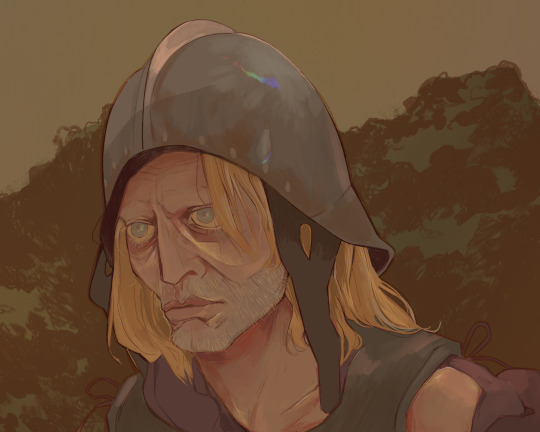
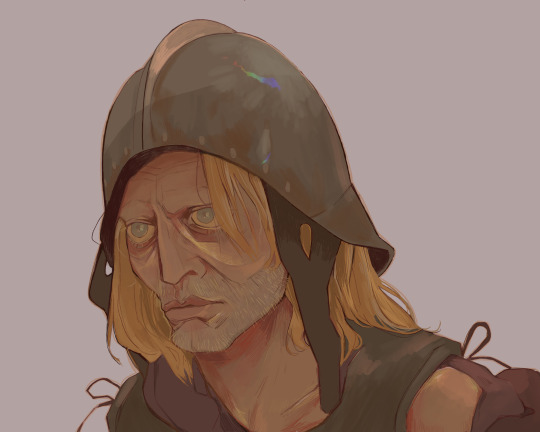
calling it done; here's the flat color
#aguirre the wrath of god#klaus kinski#artists on tumblr#procreate art#digital art#werner herzog#tired of working on this#on to the next
12 notes
·
View notes
Photo
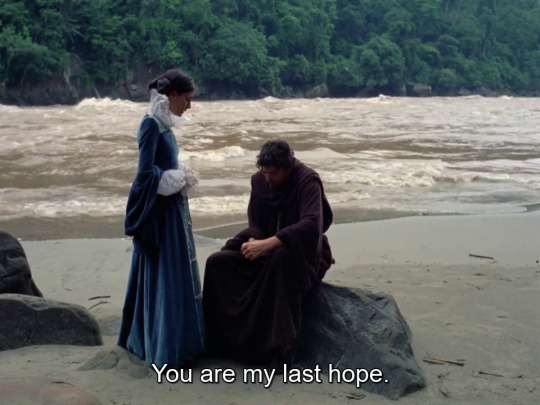
aguirre, der zorn gottes (werner herzog, 1972)
84 notes
·
View notes
Text
8 notes
·
View notes
Text
youtube
Popol Vuh – Aguirre
5 notes
·
View notes
Text


AGUIRRE, THE WRATH OF GOD (1972), dir. Werner Herzog
#aguirre der zorn gottes#aguirre the wrath of god#aguirre furore di dio#werner herzog#klaus kinski#german movies#movies#70s#yessferatu
131 notes
·
View notes
Text

42 notes
·
View notes
Text
Aguirre, the Wrath of God (1972)
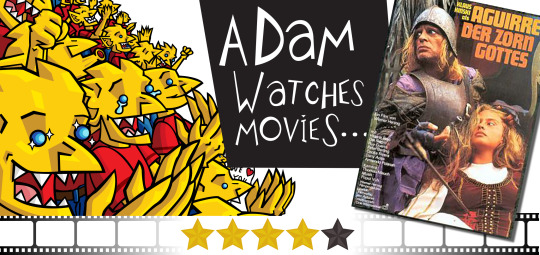
Aguirre, the Wrath of God is a unique experience. It puts you in the same state as its characters through its deliberately paced, minimalist story. They don’t know where the journey will end. Neither do you. It feels like someone is reading you the old, dusty pages of a journal that’s been dug up after decades of being forgotten. The “unimportant” moments - the kind you wouldn't mention in daily logs - are missing, which makes what’s not shown as important as what is. I wouldn’t want every film to be like Aguirre, but I’m glad this one is.
In 1560, Spanish conquistadors are convinced El Dorado, the legendary city of gold, is hidden deep in the Amazon jungle. With the search going nowhere and supplies running low, Gonzalo Pizarro (Alejandro Repullés) orders Pedro de Ursúa (Ruy Guerra) and a group of forty men (with their indigenous slaves) to build rafts and travel downriver to look for provisions. If they do not return within a week, their expedition will be considered lost.
The opening shot is a stunner. Simultaneously, we see the immeasurable power and folly of the conquistadors. The line of soldiers, noblemen and slaves traveling down the side of the Andes mountains is endless. When the camera zooms in to focus on the individual people, the spaniards look like ill-equipped martians clumsily making their way down the narrow path. In their metal armor (to defend against what?) with their halberds (to attack who?), following slaves who push cannons, wheel carts, and lavish litters carrying women dressed in fancy gowns, the expedition's imminent failure is obvious. Even if El Dorado did exist, how could they find it with this equipment slowing them down? Their quest is made even more foolish-looking by the camerawork. At first glance, the voyage looks epic. Then, reality sets in. Everything is short in a natural, unglamorous way. You "know" how this journey will end even before Don Pedro de Ursúa, his second-in-command Don Lope de Aguirre (Klaus Kinski) and Brother Gaspar de Carvajal (Del Negro) even step foot on their doomed raft.
Aguirre feels much longer than its 94-minute running time because once the journey to unknown places begins, that’s all the movie is. There are no character arcs. In fact, by the end, you barely know any of the characters. Each scene is like the highlights of a long, boring, doomed journey… that includes the sanity of the people in charge slipping away, daily attacks from unknown assailants, starvation, suspected murder, and death at every turn. It feels like journal entries brought to life in that Brother Gaspar wouldn’t have written about the life stories of the conquistadors who disappear in the middle of the jungle, or suddenly fall in the water because there’s an arrow sticking through their neck. All he does is tell us “Today, another man died. His last words were ….” The details aren’t important. What’s important is the way the movie makes you feel. Aboard the raft is a slave who knows how to play music. The only problem is that he only knows a single song, which he plays over, and over, and over. A jaunty tune becomes the sound of your sanity draining away. You see the crew making one bad decision after another, practically begging their journey to end in disaster. It can’t be that they don’t know what they’re doing. You get the impression that the jungle is compelling them to make the worst move possible. With the hallucinations that come in during the final scenes, the sudden bursts of violence that make you wonder if you just saw and heard what you did and the moments that couldn’t possibly have been scripted (they had to just happen while they were shooting), Aguirre feels so eerily real you feel like you're there. Like the men, you have no faith in any sort of satisfying ending but you keep moving forward.
Aguirre, the Wrath of God is a film for people who want something different. The plot is deliberately boring at times. Anywhere else, that would be a major flaw. Here, it enhances the experience. I know that doesn’t make any sense but that’s the thing. This movie doesn’t make any sense. It baffles you completely, which means it's unforgettable. (English dub, November 5, 2021)

#Aguirre the Wrath of God#movies#films#movie reviews#film reviews#Werner Herzog#Klaus Kinski#Helena Rojo#Del Negro#Ruy Guerra#Peter Berling#Cecilia Rivera#Dany Ades#Armando Polanah#1972 movies#1972 films
2 notes
·
View notes
